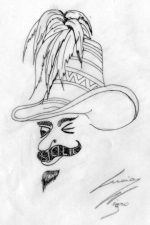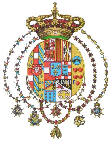
PAPERS RELATING TO BRIGANDAGE IN ITALY============================================= Presented to both Houses of Parliament by Command of Her Majesty. 1863. ============================================= LONDON PRINTED BY HARRISON AND‘ SONS. LIST OF PAPERS. |
| N | Page | ||
| 1 | Mr Odo Russell to Earl Russell | November 24, 1862 | 1 |
| 2 | Earl Russell to Earl Cowley | December 27,----- | 1 |
| 3 | Earl Cowley to Earl Russell | December 30, ----- | 2 |
| 4 | Mr Odo Russell to Earl Russell | January 14, 1863 | 2 |
Papers relating to Brigandage in Italy.
No. 1.
Mr. Odo Russell to Earl Russell.—(Received December 18.)
| (Extract.) | Rome, November 24, 1862. |
THE Bourbon Committee have lately sent a further detachment of 260 men to join Tristani’s Band on the frontier.
They were well armed and wore blue overcoats and red trowsers, so as to look like French soldiers at a distance, and thereby deceive the Italian outposts and patrols.
The men enlisted are chiefly Bavarians, Belgians, and Spaniards. Tristani’s headquarters are, according to circumstances, either at Santa Francesca or at Strangolagalli, and he draws his rations and supplies from Veroli.
It is difficult to understand for what object the Bourbon Committee continue to keep up and organize these useless bands of foreigners, who, beyond annoying the inhabitants of the Neapolitan frontiers, have achieved no other result than to discredit the cause of King Francis II.
No. 2.
Earl Russell to Earl Cowley.
| My Lord, | Foreign Office, December 27, 1862. |
HER Majesty’s Government have freely and candidly expressed their opinion to the Government of the Emperor respecting the French occupation of Rome. Her Majesty’s Government have no desire to pursue that argument further for the mere purpose of controversy.
But upon a question closely connected with the French occupation of Rome, Her Majesty’s Government must, in justice to the interests of Italy and of Europe, call upon the French Government to interfere with the Pope’s advisers. ' The Pope himself, with the benevolence which is characteristic of him, has always held that his temporal dominion ought to be a territory free from foreign quarrels and sanguinary conflicts. In this spirit, in 1848, he declared in his allocution of April 29, that he would take no part in the war of Italian independence. The passage alluded to is as follows: —“ It is wholly abhorrent from our counsels, seeing that we, although unworthy, discharge on earth the office of Him who is the author of peace and lover of charity, and agreeably to the duty of our Supreme Apostleship regard and embrace, with equal paternal earnestness of love, all tribes, peoples, nations. - In the same spirit, when the Bishops of the Roman Catholic Communion from all parts of the world went to Rome, in the course of this present year, they described Rome, in an address to the Pope, as the seat of a temporal authority, independent of any other; “ the centre, as it were, of universal concord; a place where no human ambition breathes; where no one ever intrigues for territorial dominion. - They remind the Pope of his own words, that “it is by a special disposition of Divine Providence that the Roman Pontiff, established by Christ the centre and chief of His whole Church, possesses a temporal power. - If the French army at Rome protected a Power thus holy, religious, and charitable, the evils of the French occupation would be in some degree mitigated. ‘But there is a long distance between the theory thus stated and the existing fact. The political banditti who infest the southern provinces of Italy have their head-quarters at Rome. They constantly issue from haunts rendered secure for them by the cover of the French flag, to destroy whole villages, and to murder the peaceful farmers of the south. A detachment of 260 men lately went from Rome well armed, and clothed in blue overcoats and red trousers, in order that they might look like French soldiers, and thereby deceive the Italian outposts and patrols. s If such detachments of robbers were to be sent from Switzerland into Lombardy, the Italian Government would at once protest, and the Swiss Republic would at once put an end to such an unfriendly proceeding.
At Rome, however, things are done in a different way; and the high dignitaries about the Pope’s person, as well as his illustrious guest the late King of Naples, are believed by the world in general to be the instigators of these incursions.
It is obvious that if the Roman Government were really independent, it would be at once called to account by the King of Italy for these aggressive and unjustifiable proceedings, and would not venture to disregard his just and well-founded remonstrances.
The continuance of these barbarous outrages is therefore an evil entirely owing to the French occupation of Rome, and it would cease at once if proper orders were given by the French Minister of War to the General commanding the French troops in the Roman territory. The Minister of War has but to say peremptorily “ Let brigandage cease,? and the Roman banditti would be extinguished in a fortnight.
Her Majesty’s Government cannot refrain from submitting to that of France that the Government of the Emperor ought either to leave the Roman State to settle its own quarrels, and to atone for its own misdeeds, or it ought to insist upon a behaviour on the part of the Pope which shall be peaceable towards his neighbours, and in conformity with that impartial love and universal charity professed in words by Pius IX, but utterly disregarded in action by his Minister.
Your Excellency may read this despatch to M. Drouyn de Lhuys.
I am, &c.
(Signed) RUSSELL.
No. 3.
Earl Cowley to Earl Russell.—(Received December 31.)
| My Lord, | Paris, December 30, 1862. |
I READ yesterday to M. Drouyn de Lhuys your Lordship's despatch of the 27th instant, relating to the evils ^resulting from the political brigandage which is organized at Rome against the southern provinces of Italy, and which Her Majesty’s Government consider it to be the duty of the French troops, as long as they occupy Rome, to put down and prevent.
M. Drouyn de Lhuys said that he had no objection to make to the general principles laid down in your Lordship’s despatch, and he could assure me that the Prince de la Tour d’Auvergne had gone to Rome with very strong instructions upon this important subject. » He would state, further, that the opinions of the French Government had been conveyed to the Pope, to Cardinal Antonelli, and to the ex-King of Naples, in a manner which he could not but hope would produce a proper effect. There was, no doubt, great exaggeration as to the extent of the evil complained of, but evil, he could not deny, there was; and he would take this opportunity of renewing, in pressing language, the instructions with which M. de Latour d’Auvergne was, as he had stated, already furnished.
I have, &c.
(Signed) COWLEY.
No. 4.
Mr. Odo Russell lo Earl Russell.—Received January 28.)
| (Extract.) | Rome, January 14, 1863. |
YOUR Lordship has learnt that General Count de Montebello denies, in the most positive manner, the truth of the statement relative to the passage of brigands over the frontier, contained in my despatch of the 24th of November last.
Reliable as my informants appeared to me to be, I must now suppose that they were in this case themselves deceived, and I regret to have unwittingly sent incorrect information to your Lordship.
I also regret to say that I found General de Montebello somewhat annoyed at the occurrence. He said that, by supposing that men could be armed aud equipped in Rome, and sent to the frontier without his knowledge, I had blamed his military administration of Rome; but that criticism was a matter of indifference to him, so long as his own conscience and sense of duty were satisfied.
I told the General how much I regretted that any statements of mine should have been a cause of annoyance to him; that I had made them on what I considered good authority; and that similar statements formerly made by me, had been entirely confirmed by his predecessor, General de Goyon. The means employed, I said, by the Legitimist Committee, to send men and arms to the frontier, had formerly been as follows:— The men were sent singly on foot to certain convents on the frontier, while old French uniforms were bought from the Jews in the Ghetto, and as well as arms and other equipments, carried bit by bit to isolated vignas in the Campagna, and at night packed in old herring casks, and gradually conveyed to the frontier, where they were distributed to the men already there assembled.
The General said he had entirely put an end to such proceedings; besides which, he now had the full co-operation of the Papal Government to put down brigandage, and that he could assure me on his honour that armed men could no longer leave Rome and proceed to the frontier without his knowledge, and that I had therefore been misinformed, and the statements sent home by me, and communicated by Earl Cowley to M. Drouyn de Lhuys, would prove to be incorrect.
I replied that I was glad to hear from him that he was so successful in putting down brigandage, and I hoped he would occasionally give me some correct information on these subjects as his predecessor, General de Goyon, had done.
Count de Montebello replied that he would do so, and that for the present he could tell me that Tristani’s band was reduced to about sixty men, and would probably soon be altogether disbanded and destroyed; that in Rome he had put a stop to all communication between Tristani and his employers, and that he had lately seized and confiscated, in a Roman printing establishment, about 2,000 copies of a printed Proclamation calling upon the Neapolitans to rise and join their legitimate Sovereign, King Francis II.
ITALY. Papers relating to Brigandage in Italy. Presented to both Houses of Parliament by Command of Her Majesty. 1863. JONDON: PRINTED BY HARRISON AND SONS. |
|
Quest'opera è distribuita con Licenza Creative Commons Attribuzione Non commerciale Non opere derivate 4.0 Internazionale. |
Ai sensi della legge n.62 del 7 marzo 2001 il presente sito non costituisce testata giornalistica.
Eleaml viene aggiornato secondo la disponibilità del materiale e del
Webm@ster.








